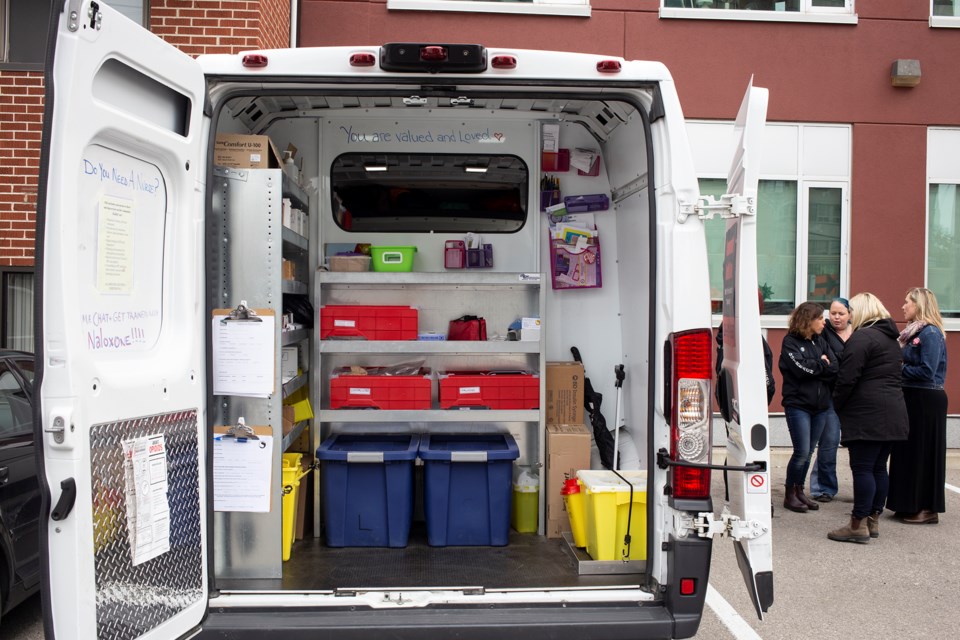Two organizations that have had success providing services to people with addictions in Guelph have begun to expand to other parts of Wellington County.
The Community Health Van, which provides a range of services to vulnerable people in Guelph two nights a week is looking to add additional nights for Minto and Erin, while Stonehenge Therapeutic Community recently opened a new Rural Wellington Rapid Access Addiction Clinic (RAAC) in Elora.
The new Elora clinic joins an existing network of RAAC sites in Guelph, Cambridge and Kitchener, said Madison Cruickshank, clinical supervisor for Stonehenge.
“What is unique about the clinics is they are specialized medical clinics for anyone who is experiencing the type of health issue related to their substance use,” said Cruickshank.
The RAAC clinic includes a peer support worker with lived experience dealing with addiction and recovery, as well as a physician and a counsellor. It offers booked appointments, as well as accepting some walk-ins.
“Having that walk-in service of being able to go somewhere that is addiction specific does absolutely break down some of those barriers for the clients we service in terms of facing stigma,” said Cruickshank.
In the six weeks it has been open, preliminary data shows alcohol addiction is being treated most at the Elora RAAC site, followed by opioids and methamphetamine, said Cruickshank.
“A lot of the folks who are using our clinic are using alcohol as a means of coping or dealing with some of their other life stresses and are not able to access care specific to that,” said Cruickshank.
People have been seeking opioid treatment for both fentanyl and prescription medication at the Elora RAAC site, said Cruickshank.
The clinic was opened in Elora because of the success of the Guelph clinic, as well as transportation challenges for people living in rural Wellington County, said Cruickshank.
“We have a lot of services here in Guelph that are available for people who are struggling with addiction and substance use issues. They just don’t have the same accessibility up there,” she said. “What we have seen is a lot of people struggling in silence in our rural communities.”
Earlier this month, Community Health Van program coordinator Colin McVicker made a presentation at Minto Township Council about plans for expanding the service to Palmerston and Erin.
The van currently operates two evenings a week in Guelph and provides a range of services to marginalized people who find it challenging to access health care in the traditional ways.
“My background has been working in Mount Forest as a health care provider with Homewood Health and one of the things I know is that there are marginalized people that are also in our rural communities,” McVicker said to the council.
Initially, the project will service Palmerston and Erin on a bi-weekly basis as a pilot project. Some testing of the service has already been done in Erin, said McVicker.
The team on the van includes a Hep C nurse and a social support coordinator from Sanguen Health Centre, as well as a mobile outreach coordinator, peer outreach worker, a public health nurse, volunteers and ARCH staff.
On its stops, people can access a range of services, from a needle exchange and other harm reduction initiatives to wound care or receiving clothing items. Some people just stop for hot chocolate, McVicker told councillors.
“It’s not the drug van — it’s like a mobile hub of service delivery,” said McVicker.
By extending service to elsewhere in the county, McVicker hopes the main funder for the project — Ontario Trillium Foundation — will extend its grant. In the meantime, the project is working on sustainability planning with potential funders, like the City of Guelph and Guelph Chamber of Commerce.
The program is registered as a charity, said McVicker and its office is overflowing with donations of items for the van staff to pass out to clients, from clothes to grocery gift cards and medical items.
“People have been very generous,” said McVicker.
A sister program operating in Waterloo Region has been funded entirely by donations for the past year, noted McVicker.
While there is a potential for the project to eventually add a second van dedicated to Wellington County, McVicker said for now it will have to use the same van that is already in operation in Guelph for the planned Erin and Palmerston stops.
